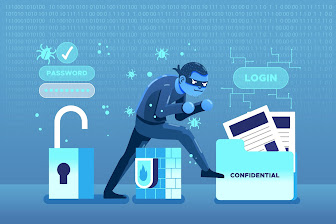Cyber Threats For Business and How to Protect Your Business from Cyber Threats
Nowadays, businesses of all sizes face cyber threats—online risks that can result in stolen information, financial loss, and even damage to reputation. Understanding and dealing with these challenges is critical for anyone running a small or large business.
Let’s look at what cyber threats are, why they matter, and simple ways to keep your business safe.
 |
| 1. Cyber Security |
What Are Cyber Threats?
Cyber threats are online dangers that can harm your business. They can target your data, systems, or even your customers’ information. Here are some common types:
1. Phishing
 |
| 2. Phishig Attack |
Phishing is when scammers pretend to be someone trustworthy (like a bank or a company) to trick you into giving them sensitive information, like passwords or credit card numbers. They often do this through fake emails that look very real.
2. Ransomware
 |
| 3. Ransomware |
Ransomware is a type of malicious software that locks up your files and demands money to unlock them. Paying the ransom doesn’t always work, and it can cost a business thousands of dollars.
3. Malware
Malware, or “malicious software,” includes viruses and spyware that sneak onto your computer through emails or bad links. It can steal data or slow down your system.
4. Insider Threats
These are risks that come from people within your organization, like employees or contractors. Sometimes it’s accidental (someone clicks on a bad link), but other times it can be intentional.
Why Should You Care About Cyber Threats?
 |
| 4. Cyber Crimes |
Cyber threats can cause serious problems for your business:
- Financial Loss: Recovering from an attack can be expensive. You might have to pay for repairs, lost data, or even legal costs.
- Damage to Reputation: Customers trust you with their information. If there’s a data breach, you could lose that trust, which can impact your business for a long time.
- Business Disruptions: Cyber attacks can shut down your operations, meaning you can’t work until the issue is fixed. For many companies, downtime means lost sales and productivity.
- Legal Issues: Laws protect personal information, and a breach can lead to fines or lawsuits if sensitive data is exposed.
Simple Steps to Protect Your Business
While no security plan is 100% foolproof, here are a few easy ways to protect your business from cyber threats:
1. Use Strong Passwords
Encourage everyone in your company to use strong, unique passwords. Avoid simple ones like “123456” or “password.” Strong passwords make it harder for hackers to get into your accounts.
2. Enable Multi-Factor Authentication (MFA)
MFA adds an extra layer of security, like a code sent to your phone when you log in. This makes it harder for someone to access your account, even if they know your password.
3. Train Your Employees
Cybersecurity isn’t just about tech—your team plays a big role. Train everyone to recognize phishing emails and avoid clicking on suspicious links. A little awareness can go a long way.
4. Keep Software Updated
Outdated software can have security holes. Regularly updating your software means you’re protected with the latest security patches, which can help keep hackers out.
5. Use Firewalls and Anti-Malware Software
A firewall helps block unwanted access to your network, and anti-malware software helps detect and remove harmful programs. Together, they add layers of security to your systems.
6. Back Up Your Data Regularly
In case something does go wrong, having backups of your data means you don’t lose everything. Back up your data regularly and store copies securely, so you can get back to business quickly.
7. Have a Plan for Cyber Incidents
If an attack happens, it’s essential to know what to do. Have a plan that covers steps like notifying your IT team, communicating with employees, and alerting customers if necessary. A quick response can reduce the damage.
 |
| 5. Steal Data |
Looking to the Future: Staying Prepared
Technology keeps changing, and so do cyber threats. New tools, like Artificial Intelligence (AI), help businesses detect threats faster, but hackers are also using these tools to create more advanced attacks. By staying informed about new security trends, you can keep your business better prepared.
In Summary
 |
| 6. Cyber Security |
Cyber threats may sound scary, but with some straightforward steps, you can make your business safer. Start by setting up strong passwords, training your team, and keeping your software updated. Even small changes can make a big difference in protecting your business and customers.




.jpg)

1 Comments
Helpful 👍
ReplyDeleteAny Doubts Feel Free And Drop A Comment!